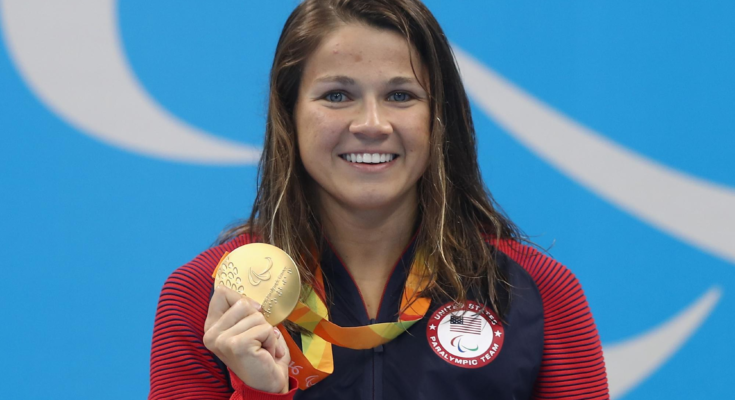Becca Meyers is a six-time Paralympic medalist with three golds from the 2016 Rio Games.
She was expected to compete for up to four medals in Tokyo. Instead she’s not going.
After the 26-year-old deaf-blind swimmer was told she couldn’t bring her mother and personal care assistant (PCA) Maria Meyers to help her navigate Tokyo and the Olympic facilities, Meyers informed Team USA that she was quitting the team.
She told the Washington Post in a story published Monday that she made the decision in part to effect change.
“I would love to go to Tokyo,” Meyers told the Post. “Swimming has given me my identity as a person. I’ve always been Becca the Swimmer Girl. I haven’t taken this lightly. This has been very difficult for me. [But] I need to say something to effect change, because this can’t go on any longer.”
Meyers’ rare genetic disorder
Meyers suffers from Usher syndrome, a genetic disorder that left her deaf at birth. The disorder has also progressively eroded her eyesight. Her vision isn’t completely gone, but it’s been recently downgraded from the least-impaired Paralympic classification of S13 to the middle class of S12, the Post reports. Paralympians designated as S11 are completely blind or close to it. According to the Post she’s the only one of 34 swimmers on the U.S. Paralympic teams who is both deaf and blind.
COVID-19 restrictions blamed for decision
The United States Olympic & Paralympic Committee told Becca’s father Mark Meyers in a June email that organizers and the Japanese government prohibited her from bringing a PCA because of COVID-19 regulations strictly limiting who is and isn’t allowed to travel to Tokyo as a member of an Olympic delegation.
He shared a copy of the email with the Post, which was sent by Rick Adams, chief of sport performance and national governing body services for the USOPC.
“There remain no exceptions to late additions to our delegation list other than the athletes and essential operational personnel per the organizing committee and the government of Japan,” Adams wrote. “As I said to you both on the phone and over email, I fully empathize with your concerns and wish we could fine [sic] a way as we have in the past.”
Could the USOPC have allowed Meyers to bring a PCA?
The Meyerses dispute that claim and argue that it’s the USOPC making the call to restrict Becca from bringing a PCA to Tokyo. They believe that the USOPC simply chose not to allocate one of its limited essential personnel slots for Maria Meyers.
“We contacted the Maryland secretary of state,” Mark Meyers told the Post. “We had somebody contact the Japanese government, the ambassador — they all say it’s not the government [and] it’s not the organizing committee. It’s the USOPC that’s blocking this.”
“They can ask for more [official credentials]. … They just did not plan for her. They knew about this [issue] in February. They said, ‘Sorry, we can’t help you.’ They’ve had time to fix this, if they asked the right people. They’ve chosen not to.”
The USOPC maintained in a statement to the Post that restrictions put in place by organizers and the Japanese government are the reason Becca Meyers is not permitted to bring a PCA to Tokyo:
“We are dealing with unprecedented restrictions around what is possible on the ground in Tokyo. As it’s been widely reported, [the Tokyo Organizing Committee of the Olympic and Paralympic Games], at the direction of the government of Japan, is not permitting any personnel other than operational essential staff with roles related to the overall execution of the games, into the country.
“This position has resulted in some athletes advising us that they will not accept a nomination to Team USA for both the Olympic and Paralympic Games. We are heartbroken for athletes needing to make agonizing decisions about whether to compete if they are unable to have their typical support resources at a major international competition, but our top priority is ensuring the safety of our athletes, coaches, staff and the citizens of the host country.”
The USOPC also noted that it will provide one PCA for the 34-member Paralympic swim team and that the team’s six coaches will also be available to assist with personal needs.
Likely end to a celebrated career
Meyers’ decision likely means that her Paralympic career is over after competing as one of the sports’ most celebrated and decorated athletes from the London and Rio Games.
“This is the Paralympics,” Becca Meyers told the Post. “We should be celebrating everyone’s disabilities. We’ve broken barriers in society, defying all odds. And yet this is how we’re treated? Like a burden on the team?”
More from Yahoo Sports:


